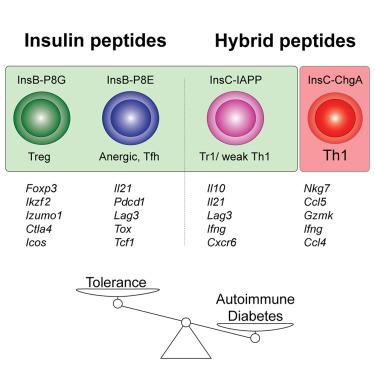Our official English website, www.x-mol.net, welcomes your
feedback! (Note: you will need to create a separate account there.)
CD4+ T cells reactive to a hybrid peptide from insulin-chromogranin A adopt a distinct effector fate and are pathogenic in autoimmune diabetes
Immunity ( IF 25.5 ) Pub Date : 2024-08-29 , DOI: 10.1016/j.immuni.2024.07.024 Jason S Mitchell 1 , Justin A Spanier 2 , Alexander J Dwyer 3 , Todd P Knutson 4 , Mohannad H Alkhatib 3 , Gina Qian 3 , Matthew E Weno 3 , Yixin Chen 3 , Zachary R Shaheen 5 , Christopher G Tucker 3 , Takashi O Kangas 3 , Milagros Silva Morales 3 , Nubia Silva 6 , Tsuneyasu Kaisho 7 , Michael A Farrar 8 , Brian T Fife 2
Immunity ( IF 25.5 ) Pub Date : 2024-08-29 , DOI: 10.1016/j.immuni.2024.07.024 Jason S Mitchell 1 , Justin A Spanier 2 , Alexander J Dwyer 3 , Todd P Knutson 4 , Mohannad H Alkhatib 3 , Gina Qian 3 , Matthew E Weno 3 , Yixin Chen 3 , Zachary R Shaheen 5 , Christopher G Tucker 3 , Takashi O Kangas 3 , Milagros Silva Morales 3 , Nubia Silva 6 , Tsuneyasu Kaisho 7 , Michael A Farrar 8 , Brian T Fife 2
Affiliation

|
T cell-mediated islet destruction is a hallmark of autoimmune diabetes. Here, we examined the dynamics and pathogenicity of CD4+ T cell responses to four different insulin-derived epitopes during diabetes initiation in non-obese diabetic (NOD) mice. Single-cell RNA sequencing of tetramer-sorted CD4+ T cells from the pancreas revealed that islet-antigen-specific T cells adopted a wide variety of fates and required XCR1+ dendritic cells for their activation. Hybrid-insulin C-chromogranin A (InsC-ChgA)-specific CD4+ T cells skewed toward a distinct T helper type 1 (Th1) effector phenotype, whereas the majority of insulin B chain and hybrid-insulin C-islet amyloid polypeptide-specific CD4+ T cells exhibited a regulatory phenotype and early or weak Th1 phenotype, respectively. InsC-ChgA-specific CD4+ T cells were uniquely pathogenic upon transfer, and an anti-InsC-ChgA:IAg7 antibody prevented spontaneous diabetes. Our findings highlight the heterogeneity of T cell responses to insulin-derived epitopes in diabetes and argue for the feasibility of antigen-specific therapies that blunts the response of pathogenic CD4+ T cells causing autoimmunity.
中文翻译:

与胰岛素-嗜铬粒蛋白 A 的杂交肽反应的 CD4+ T 细胞具有不同的效应命运,在自身免疫性糖尿病中具有致病性
T 细胞介导的胰岛破坏是自身免疫性糖尿病的标志。在这里,我们检查了非肥胖糖尿病 (NOD) 小鼠糖尿病启动期间 CD4 + T 细胞对四种不同胰岛素衍生表位的反应的动力学和致病性。来自胰腺的四聚体分选的 CD4+ T 细胞的单细胞 RNA 测序显示,胰岛抗原特异性 T 细胞采用多种命运,并且需要 XCR1+ 树突状细胞来激活。杂交胰岛素 C-嗜铬粒蛋白 A (InsC-ChgA) 特异性 CD4+ T 细胞偏向于不同的辅助性 T 型 1 (Th1) 效应表型,而大多数胰岛素 B 链和杂交胰岛素 C 胰岛淀粉样蛋白多肽特异性 CD4+ T 细胞分别表现出调节表型和早期或弱 Th1 表型。InsC-ChgA 特异性 CD4 + T 细胞在转移时具有独特的致病性,抗 InsC-ChgA:IAg7 抗体可预防自发性糖尿病。我们的研究结果强调了糖尿病中 T 细胞对胰岛素衍生表位反应的异质性,并论证了抗原特异性疗法的可行性,该疗法可以减弱引起自身免疫的致病性 CD4+ T 细胞的反应。
更新日期:2024-08-29
中文翻译:

与胰岛素-嗜铬粒蛋白 A 的杂交肽反应的 CD4+ T 细胞具有不同的效应命运,在自身免疫性糖尿病中具有致病性
T 细胞介导的胰岛破坏是自身免疫性糖尿病的标志。在这里,我们检查了非肥胖糖尿病 (NOD) 小鼠糖尿病启动期间 CD4 + T 细胞对四种不同胰岛素衍生表位的反应的动力学和致病性。来自胰腺的四聚体分选的 CD4+ T 细胞的单细胞 RNA 测序显示,胰岛抗原特异性 T 细胞采用多种命运,并且需要 XCR1+ 树突状细胞来激活。杂交胰岛素 C-嗜铬粒蛋白 A (InsC-ChgA) 特异性 CD4+ T 细胞偏向于不同的辅助性 T 型 1 (Th1) 效应表型,而大多数胰岛素 B 链和杂交胰岛素 C 胰岛淀粉样蛋白多肽特异性 CD4+ T 细胞分别表现出调节表型和早期或弱 Th1 表型。InsC-ChgA 特异性 CD4 + T 细胞在转移时具有独特的致病性,抗 InsC-ChgA:IAg7 抗体可预防自发性糖尿病。我们的研究结果强调了糖尿病中 T 细胞对胰岛素衍生表位反应的异质性,并论证了抗原特异性疗法的可行性,该疗法可以减弱引起自身免疫的致病性 CD4+ T 细胞的反应。


















































 京公网安备 11010802027423号
京公网安备 11010802027423号